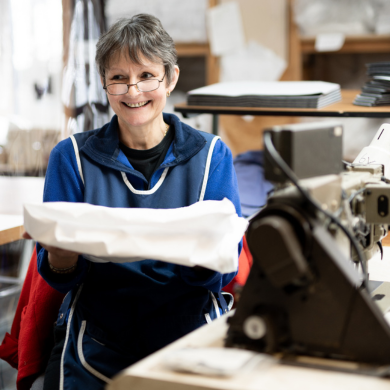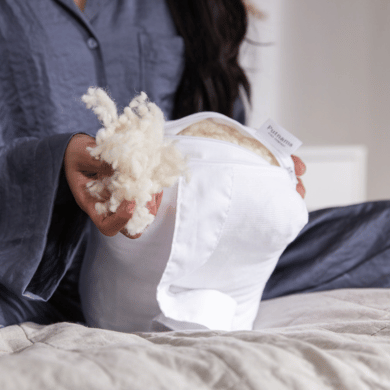
Wool vs. Synthetic Bedding – Which is Better?
It's the eternal question as old as time itself, wool vs. synthetic bedding - which is better? Choosing the right bedding is more than just a matter of preference, it directly affects your sleep quality and overall well-being.
A well-chosen duvet or pillow can mean the difference between waking up refreshed or enduring restless nights. But with so many bedding options available, where do you begin?
One of the most common dilemmas is deciding between wool and synthetic bedding. Let's compare these two popular choices, focusing on comfort, longevity, and eco-friendliness, to help you make the best choice for your needs.
Comfort: How Does Each Material Perform?
Your comfort during sleep relies on the bedding's ability to maintain an optimal sleeping environment. Wool and synthetic materials each bring unique qualities to the table.
Wool Bedding
Wool is a standout choice for its natural temperature-regulating properties.
It keeps you warm in winter and cool in summer by effectively wicking away moisture and allowing air to circulate. According to studies, wool can absorb up to 30% of its weight in moisture without feeling damp, preventing clamminess on humid nights. Its breathability ensures even hot sleepers stay comfortable. (British Wool)
Wool is also hypoallergenic, resistant to dust mites, and naturally antimicrobial. These qualities make it ideal for people prone to allergies or asthma.
Studies show that sleeping with wool bedding can increase deep stage 4 regenerative sleep by 25% compared to synthetic alternatives. This is due to wool's natural temperature regulation and moisture-wicking properties.
Furthermore, because wool bedding conforms gently to your body, it provides a comforting and luxurious sleep experience.
See also - The Benefits of Wool Bedding for Year-Round Comfort
Synthetic Bedding
Synthetic duvets and pillows, often made from polyester or microfibre, mimic the softness of natural materials like down.
They are designed to be lightweight and cosy with some high-quality options effectively imitating that "fluffy" feeling many find appealing.
However, synthetic materials lack the breathability and moisture-wicking capabilities of wool. Poor ventilation can trap heat, causing some sleepers to feel overly warm or sweaty, particularly during warmer months.
While synthetic bedding can be a suitable option for those looking for softness at a lower cost, its comfort can vary greatly depending on the quality of the product.
Longevity: Which Bedding Stands the Test of Time?
Durability is another critical factor to consider when investing in bedding.
Wool Bedding
Wool scores exceptionally high in terms of longevity.
Wool fibres are naturally elastic and resistant to flattening, ensuring your duvet or pillow retains its shape over time. Unlike synthetic options, wool does not clump, making it less likely to need frequent fluffing or replacement.
With proper care, wool bedding can last for years without losing its performance or structure.
Here at Putnams we craft our wool bedding with premium materials and meticulous attention to detail. Our wool duvets are hand-stitched, ensuring the filling remains evenly distributed, eliminating the frustrating issue of "cold spots" caused by shifting materials.
See also - The Lifecycle of a Wool Pillow: From Farm to Bedroom (and Back to Nature)
Synthetic Bedding
Synthetic bedding tends to wear out faster than wool over time.
While lower in upfront cost, polyester fillings often lose their loft and insulating properties, leading to flat, thin duvets that need replacing every few years. Higher-end synthetics may offer improved resilience, but they still can't match the durability of natural wool.
However, if you’re looking for bedding with a shorter-term use in mind, synthetic might suit your plans better.
Eco-Friendliness: British Wool's Sustainable Edge
Sustainability has become a major concern for many buyers, and bedding materials can make a significant environmental impact.
100% British Wool Bedding
100% British Wool is one of the most eco-friendly bedding materials available.
It comes from a renewable resource, sheep’s fleece, which regrows after shearing and is fully biodegradable. When 100% British wool products are eventually disposed of, they naturally decompose, enriching the soil without leaving harmful residues behind.
Furthermore, 100% British wool bedding typically requires less frequent washing and can often be air-dried to refresh, reducing water and energy usage.
We at Putnams enhance our eco-friendly ethos by using ethically sourced, chemical-free 100% British wool, produced with high standards of animal welfare.
Choosing 100% British wool supports over 150,000 jobs in the UK sheep farming industry and contributes £1.3 billion annually to the economy.
See also - Ethical Bedding: How Choosing British Wool Supports Local Farmers and the UK Economy
Synthetic Bedding
By contrast, synthetic bedding is derived from petroleum-based fabrics, such as polyester. While the production of synthetic materials is cost-effective, it relies heavily on fossil fuels, contributing significantly to carbon emissions.
Additionally, every wash of synthetic fabrics releases microplastics into the water supply, which eventually end up in oceans, harming marine life. Disposing of synthetic bedding is also problematic, as it takes centuries to break down in landfills.
For environmentally conscious customers, British wool bedding offers a clear advantage when reducing your ecological footprint.
See also - The Hidden Plastics in Your Bedding: Why Wool and Buckwheat Are the Eco-Friendly Alternative
Why Choose Putnams?
Putnams provides a bedding collection designed with your comfort, health, and sustainability in mind. Our British wool bedding boasts the following standout features:
- Temperature Regulation: Facilitates a breathable and moisture-free sleep throughout the year.
- Hypoallergenic Design: Resistant to dust mites and allergens, creating a healthier bedtime environment.
- Durability: High-quality 100% British wool filling ensures long-lasting performance, eliminating the need for repetitive replacements.
- Sustainability: Made from ethically sourced, biodegradable British wool that supports responsible farming practices.
By choosing Putnams’ 100% British wool bedding, you're investing in premium comfort while supporting a brand committed to high ethical and environmental standards.
Final Recommendations
When deciding between wool and synthetic bedding, consider your priorities:
- If you value breathable comfort, long-term durability, and sustainable living, wool bedding is the clear choice and well worth the investment.
- If you’re on a strict budget, looking for short-term bedding, or need something hypoallergenic and machine washable, synthetic options might meet your needs.
For a truly restful night’s sleep and peace of mind, we recommend exploring the Putnams collection. Our 100% British wool bedding range delivers exceptional quality and longevity, helping you sleep better while making a positive impact on the planet.
Visit Putnams Collection today to find your perfect bedding match!

















Leave a comment